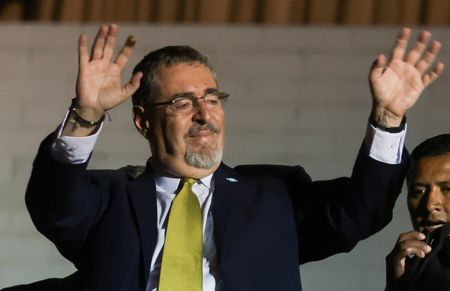 1
1 1
1
By Cassandra Garrison and Sofia Menchu
GUATEMALA CITY (Reuters) – International leaders congratulated Bernardo Arevalo on his resounding victory in Sunday’s Guatemalan presidential election, a win long believed impossible for the anti-graft candidate in a process dogged by accusations of government meddling.
Arevalo, a 64-year-old former diplomat and son of Guatemala’s first democratically elected president, captured 58% of votes versus former first lady Sandra Torres’ 37%, with all votes counted.
A U.S. State Department official said Guatemala’s people had spoken and that the vote’s outcome was final.
“Based on the results announced by the TSE and corroborated by observation missions, we congratulate Bernardo Arevalo on his election.
“We look forward to working with Guatemala’s president-elect to strengthen the long and productive partnership between our countries.”
European Union foreign policy chief Josep Borrell said the election result was “very clear” and hailed the Guatemalan government’s pledge to ensure an orderly handover of power.
His congratulations were echoed by neighboring leaders including Mexican President Andres Manuel Lopez Obrador, President Xiomara Castro of Honduras, and Nicaragua’s Daniel Ortega.
Luis Almagro, head of the Organization of American States (OAS), said in a post on X, formerly known as Twitter, that Guatemala had an “exemplary election day.”
Arevalo, who ran an anti-corruption campaign, had faced an uphill battle. Defying polls, he claimed a surprise second place in a first-round vote in June, triggering a runoff. A number of other opposition candidates had been barred from running.
His competitor Torres alleged irregularities in the first round of voting and Arevalo’s party, Semilla, was briefly suspended at the request of a top Guatemalan prosecutor.
By Monday afternoon, Torres had yet to accept her loss publicly. In a press conference Sunday, she said she was “worried” about the integrity of the vote.
Her UNE party said it would take a position once the elections results were put out “with total transparency.”
An OAS representative, with a team of 86 observers in Guatemala, said voting went smoothly and the election “fulfilled all the demanding obligations.” An EU mission is expected to put out a preliminary statement about its findings on Tuesday.
TRANSITION WORRIES
The EU, as well as governments such as Brazil and Norway, said they expected a peaceful transition of power, which outgoing President Alejandro Giammattei vowed to guarantee.
However, attempts to stymie Arevalo are likely, said Risa Grais-Targow, an analyst at consultancy Eurasia Group.
“The ruling pact will likely continue to target electoral officials and Arevalo’s Semilla party with investigations ahead of January’s change in government,” she said.
Giammattei said on X he had congratulated Arevalo, and invited him to meet the day after results were finalized.
Lacking a majority in Congress, Arevalo faces a tough transition and challenges in office. Guatemala has been roiled by violence and food insecurity and its citizens make up the largest number of Central Americans trying to enter the U.S.
Still, his win was “an opportunity to rebuild the rule of law in a country where those in power have used their position to protect themselves and their cronies,” said Tamara Taraciuk of U.S.-based think tank the Inter-American Dialogue.
From a macroeconomic standpoint, Arevalo will take charge of a country with strong fundamentals, but will likely struggle to implement his social agenda, analysts at JPMorgan wrote.
He will also need to get momentum going to reverse the damage done to Guatemala’s democracy, said former U.S. ambassador to the country Donald Planty.
“That’s not something one reverses in a short period of time,” Planty said, but added he hoped Arevalo can leave progress for his successor to build on.
Arevalo said he had already spoken with Mexican leader Lopez Obrador and Salvadoran President Nayib Bukele about Guatemala’s agenda with its neighbors.
TAIWAN
Taiwan said it had congratulated Arevalo on the win, despite the candidate’s promise to strengthen Guatemala’s ties with China alongside its longstanding alliance with Taiwan.
Guatemala is one of only 13 countries to maintain formal diplomatic ties with the Chinese-claimed island, and China holds that no country it has ties with can maintain separate diplomatic relations with Taipei.
(Reporting Cassandra Garrison, Kylie Madry and Sofia Menchi; Additional reporting by Gabriel Araujo in Sao Paolo and Daphne Psaledakis in Washington; Editing by Chizu Nomiyama, Jonathan Oatis and David Gregorio)